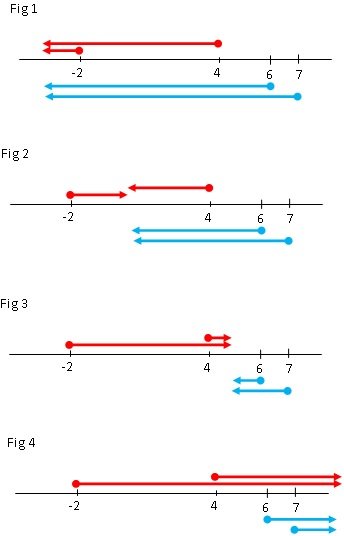rrsnathan wrote:
VeritasPrepKarishma wrote:
kanusha wrote:
My answer is C
its by plugging in method
1. From 1st equation , if x = 1 , then |x| + |x-1| = 1 , then its yes
if x = 5 , 9 # 1 , so No
so Equation 1 is No
2. From 2nd equation , of x = -1 , then its No
x = 1 its yes
so equation is No
3. using both , x = 0 then its Definite yes
So C..

Is my approach is Right

Using both, you get 0 <= x <= 1
x can lie anywhere from 0 to 1. Just trying the extreme values is not a good idea. You must try some values from the middle too i.e. x = 1/2, 1/4 etc.
Though establishing something by plugging in values is always tricky. You can try to negate a universal statement by looking for one value for which the statement doesn't hold but since you cannot try every value for which a statement must hold, its treacherous to depend on number plugging in this case. You should try to use logic.
Hi Karishma,
Please explain with an example how to find values for X when there is modulus in the equation.
For example |x-6| + |7-x| - | 4 - x| = |x + 2|
Thanks in Advance,
Rrsnathan.
The method stays the same though the thinking gets a little more complicated.
|x-6| + |7-x| - | 4 - x| = |x + 2|
|x-6| + |x - 7| = |x - 4| + |x + 2|
x is a point whose sum of distance from 6 and 7 is equal to sum of distance from 4 and -2.
Let's look at the various regions. We want the sum of lengths of red lines to be equal to sum of lengths of blue lines.
Attachment:
 Ques3.jpg [ 25.97 KiB | Viewed 5005 times ]
Ques3.jpg [ 25.97 KiB | Viewed 5005 times ]
In Fig 1 (x lies to the left of -2), the sum of blue lines will always be greater than red lines since 6 and 7 are to the right so they will always need to cover extra distance.
In Fig 2 (x lies between -2 and 4), no matter where x is the sum of length of red lines is 6 units. Can the sum of blue lines be 6? Yes, from 7 to 4, one blue line covers 3 unit and from 6 to 4, the other blue line covers 2 units. Now both together need to cover 1 more unit so x will lie 0.5 unit to the left of 4 which gives the point 3.5.
In Fig 3 (x lies between 4 and 6 or between 6 and 7), the long red line will be at least 6 units and the maximum sum of blue lines can be 2 units + 3 units = 5 units. Hence sum of red lines will always be greater.
In Fig 4 (x lies to the right of 7), the red lines will always cover more distance than the blue lines since their points are to the left.
Hence, there is only one solution x = 3.5



 45%
(medium)
45%
(medium)
 35%
(01:30)
wrong
35%
(01:30)
wrong  based on 1042
sessions
based on 1042
sessions

